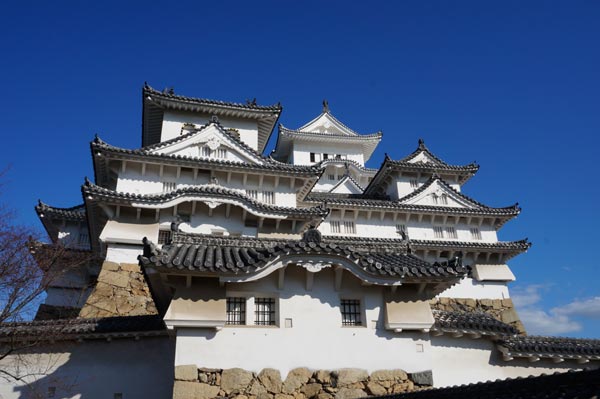

Himeji Castle in Himeji, Japan. Photo provided to China Daily
More Chinese holidaymakers are visiting Japan due to easier requirements for multiple-entry visas and the depreciation of the Japanese yen against the US dollar.
Japan extended the validity of three-year multiple-entry visas to five years for high-income Chinese visitors and these tourists have unrestricted travel throughout the country.
Another development benefits those who have paid a short visit to Japan in the last three years. Their economic status while applying for three-year multiple-entry visas changes from sufficient to certain.
The visa requires that their first destination is Okinawa or one of the three disaster-hit prefectures-Iwate, Miyagi and Fukushima-and that they spend at least one night there. After that, they can tour Japan freely.
According to the Japan National Tourism Organization, 2.41 million Chinese people traveled to Japan last year, an increase of 83 percent from 2013. The Chinese mainland is the third largest source of overseas tourists for the country, after Taiwan and South Korea.
"The new visa policy allows more Chinese to visit Japan unrestrictedly. With multiple-entry visas, they can start an independent tour whenever they want, enjoy delicious cuisine, shopping sprees and hot springs," says Hideki Ijichi, chief representative of the Japan National Tourism Organization's Beijing office.
"To keep these customers, travel agencies have to offer inexpensive and charming tours. They have also prepared three- or four-day itineraries, to meet these customers' flexibility."
According to the Japanese embassy in Beijing, more than 250,000 Japanese visas of all types were issued to the Chinese in January. Chinese tourists have to apply for a Japanese visa through agencies accredited by the embassy.
"Applicants should communicate with the accredited agencies. The rejection of a visa application is rare. The agencies will tell applicants the requirements, how to prepare the needed documents, and won't send us ineligible applications," says Keiji Kamei, a consular official at the embassy.
"The new visa policy saves time and money for independent Chinese travelers. The number of those enquiring about visas and purchasing tours to Japan is increasing," says Dai Yu, marketing director of the tourism department at Ctrip, a major Chinese online travel agency.
Ctrip's independent and group tours for Spring Festival became the most popular in recent years, and sold out immediately. Dai says that with the announcement of the new visa policy, Ctrip has been developing independent and group tours such as in-depth travel, theme tours and development of new destinations.
He says the agency recently unveiled its cartoon-themed itineraries that combine famous scenic spots in Japanese cartoons. In Tokyo, holidaymakers can visit Ghibli Museum to enjoy the scenes and characters from Japanese film director and animator Hayao Miyazaki and play with Hello Kitty in the indoor theme park, Sanrio Puroland.
Dai notices that Chinese visitors are more interested in detailed, independent tours of single cities including Osaka, Tokyo and Kyushu. Less-crowded destinations such as Lagoshima, Okinawa and Nagasaki are attracting more Chinese visitors. There is also a rising number of repeat Chinese visitors to Japan.
"I'm amazed that Tokyo is so beautiful and clean, with well-designed architecture. The Japanese are very hospitable and polite, including strangers, hotel waiters and waitresses, and cosmetics sales staff," says Zhang Ning, 30, from Shanghai. She visited Tokyo in January and plans to visit Japan again.
According to Dai, most Chinese travelers to Japan in the past few years were middle class people aged between 30 and 40. Nowadays the age groups are diverse, and the proportion of university students and the elderly is rising.
"Many Chinese customers join traditional group tours, especially the itineraries between Tokyo and Osaka. It's like taking a bus, with fixed itineraries. Some choose the more expensive customized tours, and they can decide the itineraries just like taking a taxi," says Wang Guangxin, 33. He is in charge of the outbound and inbound tours of the Tokyo office of Nagoya-based Caravan Tour Co. He has lived in Japan for nine years.
According to Wang, Chinese visitors like to go shopping, dress up in kimonos and they enjoy tea ceremonies, kabuki performances and delicious food. The number of those who come to ski in winter is increasing.
At the same time, Chinese travel agencies are confident that the depreciation of the yen in recent months will further boost the Japanese tourism market. In November, it fell to a seven-year low against the dollar.
"Shopping in Japan is very important for Chinese visitors. The devaluation of the yen makes the travel cost lower and Japanese goods cheaper. In the beginning of 2014, 10,000 Japanese yen equaled about 800 yuan, but it is more than 500 yuan now," says Rao Tian, deputy general manager of the overseas tourism department, China International Travel Service Limited, Head Office.
Wang says it's a double-edged sword. On the one hand, more and more foreigners are visiting Japan. On the other hand, the Japanese are shifting to domestic travel away from overseas tours.
"The problem is that it's not easy to book a train ticket or accommodations at peak seasons. It's Japan's national strategy to build a tourism country, but they don't have sufficient tourism capacity."
Wang suggests that those who travel to popular places in peak seasons, such as Hokkaido in winter, should make their tour plans at least three months in advance to ensure the best travel experience.
He also recommends a less-crowded destination, the Tohoku region of Japan, which consists of the northeastern portion of Honshu Island. It offers excellent hot springs, ski areas and many places to enjoy red leaves and cherry blossoms.
Copyright ©1999-2018
Chinanews.com. All rights reserved.
Reproduction in whole or in part without permission is prohibited.